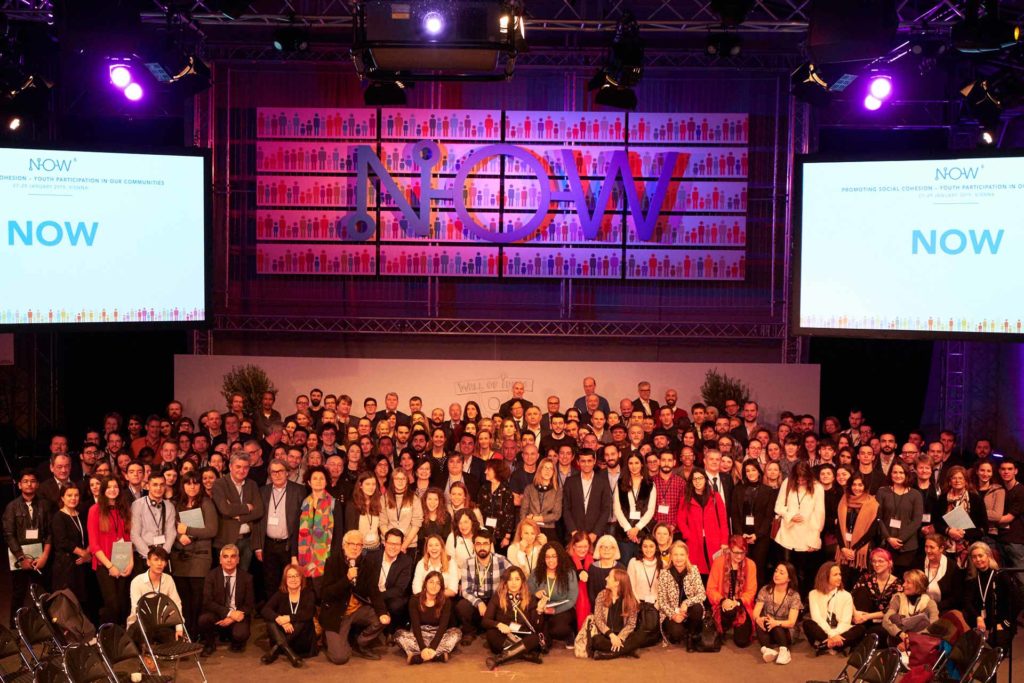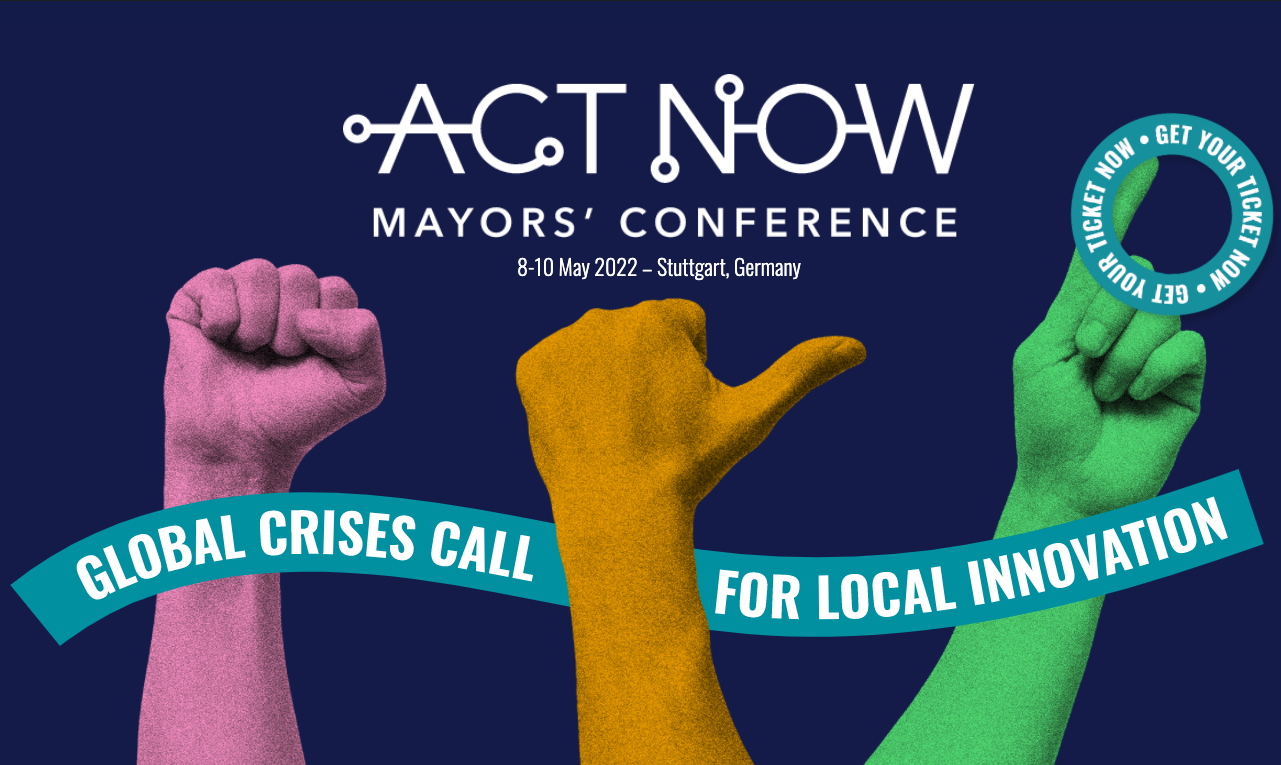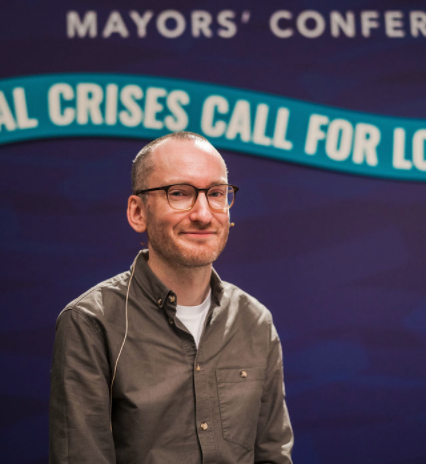Promoting Social Cohesion – Youth Participation in our Communities
Frank, open, uncensored, and on equal terms: The 6th International Mayors’ Conference NOW provided ample space for intense dialogue and innovative formats, such as Sparkling Inputs and World Cafés, to discuss the concerns of young people and find ways to involve them in decision-making processes. From 28 to 29 January 2019, some 240 participants from 28 countries – about a third of them young people as well as policymakers, representatives of NGOs, and experts – took a closer look at the questions of how to promote social cohesion and facilitate participation.
What the society of tomorrow will look like is decided here and now. Although they are directly affected by the consequences of these decisions, young people are often not sufficiently taken into account. Dedicated to the overarching theme “Promoting Social Cohesion – Youth Participation in our Communities”, the International Mayors’ Conference NOW, hosted by Act.Now from 28 to 29 January 2019 for the sixth time, enabled young people to finally take centre stage. Talking with young people instead of about them was the primary objective of the two-day conference at the Gösserhalle venue in Vienna.
The event took place under the auspices of the Austrian Federal President, Dr. Alexander Van der Bellen, and was organised in cooperation with the City of Vienna, represented by Mag. Jürgen Czernohorszky (Executive City Councillor for Education, Integration, Youth and Personnel), who opened the conference together with the founders of Act.Now, André Heller, Patricia Kahane and Elke Zuckermann. “Politics shall always strive to reach all people and understand their concerns. This is particularly true for children and adolescents,” as Czernohorszky explained. Welcomed by the attending mayors with great interest, the City of Vienna will launch a new project to offer thousands of young people the opportunity to participate. “Trust and respect are indispensable values for any society that includes young people.” A great personality to embody these values, as Czernohorszky said, was Pawel Adamowicz. The participants of the NOW Conference held a moment of silence to pay their respects to the mayor of Gdańsk, who was violently assassinated two weeks earlier.
Diversity of Perspectives: Three-Generations-Talk
The beginning of the conference was marked by a special press conference bringing together three generations in one panel: André Heller (born 1947, co-founder of Act.Now), Diana Guenther (born 1971, researcher and community development worker focusing on participation of marginalised youth in Canada) and Natalie Haas (born 1995, Austrian UN Youth Delegate) shed light on the issue of youth participation from their individual perspectives. “This participation must be possible at all levels of society – from kindergarten to international politics.” According to André Heller, “In earlier times, participation was not even possible at the family level,” which is also why there was still a lot of work to be done. “Young people are well-informed, concentrated, and don’t take important issues lightly. It actually borders on insolence to not listen to them. We should rather encourage them to get involved.” A global challenge that requires the immediate participation of young people, today more than ever before, is climate change – as all three generations agree. After all, “Older generations will probably not have to deal with the consequences of climate change anymore, but young people for sure,” Haas attested. The three panellists could also agree on other important issues, such as the precarious job situation of young people and the future of democracy. “We need young people to solve these problems. Young people are creative, question everything, and are less willing to live with compromises,” emphasised Diana Guenther. A joint approach to solve these problems, the entire panel agreed, must be based on political participation at all levels. We need “politics to address structural inequality. No politics of fear,” so Guenther. One of Heller’s ideas attracted special attention: “It would be good for all of us, if at least one third of our parliament consisted of young people.”
Promising Practices: Imitation Welcome
In the course of a walking tour, the participants of the conference shared their experiences on exemplary projects in the areas of youth participation, social cohesion, education and integration from 15 different countries. Sarah Susanj (former child mayor), for example, presented the “Children & Youth Council” in Opatija (Croatia), founded in 2001: this setting enables children and young people to play a part in the city and to express their opinions on all questions related to them. The Children & Youth Council is made up of representatives from all levels of primary school as well as two representatives from disadvantaged areas in Opatija. Inspiration, encouragement and networking: these are the three pillars of the Austrian initiative “Schule im Aufbruch”, presented by Peter Schipek. The primary goal of the initiative is to support children in further developing their potential, enthusiasm and creativity in school, and to encourage schools to make it happen.
Inspiration & Discussion
The segment “Sparkling Inputs” – short presentations with visuals – provides further inspiration and cause for discussion. The 17-year-old Fahima Elmi (Dutch Ambassador to the Forgotten Child Foundation and first nominee from the Netherlands for the International Children’s Peace Prize) encouraged her peers to actively promote change. When she was just eleven years old, Fahima managed to have Dutch shelters for women offering child care. “Each and every one of us can be a change maker. Changes don’t always have to be big. And it is perfectly fine to not always have an answer to everything. Don’t ever be afraid to speak your mind. Change begins in our heads. Change begins here and now.” Ali Mahlodji, founder of whatchado and European Youth Ambassador, wanted everyone to believe in their potential and to not give in to disorientation. We cannot quit – just like a child that keeps on trying to get up and walk even after falling over dozens of times. According to Gari Pavkovic, the long-standing head of integration policy in the city of Stuttgart, integration and participation should always be considered together. With a share of 45 per cent immigrants in Stuttgart, the city is committed to granting all residents the same opportunities and options of participation.


